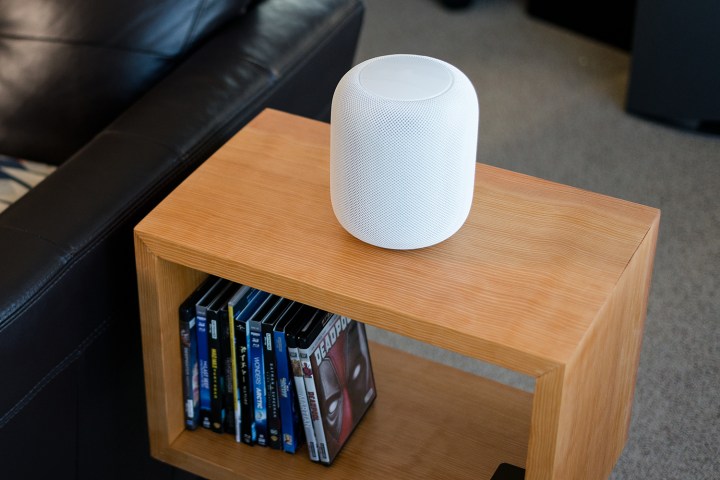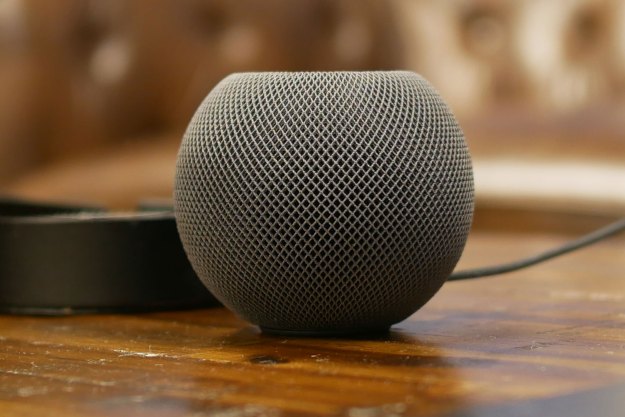We try to be charitable here at Digital Trends. Every time I’ve written about the Apple HomePod, I‘ve described its launch as “challenging,” or “difficult,” or any other adjective I can use except “disastrous.” Smart home is my beat. And boy, did Apple get beat in this particular market.
The history of Apple always has a lesson, and it’s usually that you can do better. So, do better.
There was a big Apple event today, September 10 – and there was a ton of Apple news. We saw new iPhones as expected — there will reportedly be an iPhone 11, iPhone Pro, and iPhone Pro Max. But what about the HomePod? The original is pretty cool in a lot of ways, and everybody loves a cool smart speaker — especially us — but could you make the thing smaller and cheaper and easy to use? How hard is that?
Did we see a new HomePod today? No, we did not.
Being priced out from the get-go
The HomePod launched with a retail price of $350, which is relatively inexpensive compared to the Apple ecosystem of products, but it was way, way late compared to Amazon’s Alexa, super-expensive compared to the Google Home, and just didn’t work that great unless you were married to Apple’s stuff — Apple Music, etc.
Sure, the HomePod works fine, but it only does fine when you put it put against the premium versions of Amazon and Google speakers. Not all of us are in the top tax brackets, guys.
Here’s the other thing. The people that really like smart speakers tend to have bigger places than those of us living in tiny homes. That means they need multiple speakers to cover the joint. According to a CNBC report released earlier this year, about one-third of Echo and Google Home users have multiple units, which is doable if your gadget is affordable.

A reason to go small
It’s possible that Apple will drop a reasonably priced HomePod Mini eventually (the rumor mill around this is notoriously unreliable), but we’ll see. They should. Even though there haven’t been any confirmed whispers about the possibility of it happening, it’d be a smart thing to do given the current situation of the smart speaker landscape. Samsung is already beta testing a new Galaxy Home Mini smart speaker that’s very pretty and should also hit the market at a fraction of the price of an Apple product.
What do we lose? Yes, it would be smaller and less powerful – that’s the price of miniaturization. The HomePod has some unique features — for example, it can tell if it’s been moved, and direct sound accordingly. The gizmo is chock full of microphones, too, so those might have to be dialed back or improved.
And the thing has to be cheaper, like we said. More than 50 percent of Echo and Google Home devices sold are the cheaper models, less than $100 total. If you want to drop some HomePods in a three-bedroom house, you’re looking at a thousand bucks, easy.

Catching up with demand
The good news is that a ton of people already have iPhones and iPads, so making a cool little gizmo that they could interact with via an interface they’re already familiar with would be one hell of an attractive product.
It was kind of telling when Apple, famous for almost never putting anything on sale, dropped the price of the HomePod to $300 a while back. There’s a robust market for low-cost speakers, regardless of the quality, but Apple is still stuck on its reputation for being the latest and greatest technology available.
Otherwise, my bros at Apple, you’re ripping people off, guys. Unless you have a teleporter ready to roll out, it’s time to compete with the real-world market. These days, what the real world wants is devices that are small, fast, easy to buy, and affordable. You’re good at impressing consumers with the latest and greatest innovations. Impress us now by giving the people what they really want.
Editors' Recommendations
- New Yale Assure Lock 2 models get fingerprint scanner, support for Apple Home keys
- 6 things you didn’t know Apple Homekit could do
- GE Lighting launches Smart Hexagon Panels with support for Alexa and Google Home
- Aqara launches U100 smart lock with full Apple HomeKit support
- The smart home market might see big changes in 2023


